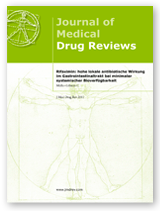
Das Journal of Medical Drug Reviews ist ein "Open Access"-Journal. Alle Artikel können für die persönliche Information des einzelnen Nutzers kostenlos heruntergeladen werden. Hingegen ist für eine kommerzielle Nutzung der Inhalte dieses Journals in jedwedem Medium die schriftliche Genehmigung des Verlages zwingend erforderlich. Das Urheberrecht liegt ausschließlich beim Verlag Reprint Publications GmbH & Co. KG.
© Reprint Publications 2016,
Webdesign Bothgrafik,
Programmierung amr
Indacaterol in COPD: the first ultra-long-acting ß2-agonist
J Med Drug Rev 2011;1;21-28ABSTRACT (Review-Artikel in deutscher Sprache)
The standard maintenance therapy of chronic obstructive pulmonary disease (COPD) comprises the anticholinergic tiotropium as well as long-acting ß2-agonists like salmeterol and formoterol. For quite some time now, clinicians have asked for longer-acting ß2-agonists allowing once daily application, enhancing patient compliance and thus providing an alternative to tiotropium with no anticholinergic side effects. The launch of indacaterol has provided the first ß2-agonist with 24-h-activity, which in contrast to salmeterol and formoterol must be inhaled once daily only.
Several clinical trials have proven that the long efficacy over 24 hours not only results in a clear advantage regarding compliance, but also in a more stable and enduring bronchodilation with positive effects on the patient’s clinical situation and quality of life.
Six major phase III trials (INLIGHT-1, INLIGHT-2, INHANCE, INVOLVE, INSIST, INTIME) have demonstrated that 150 μg and 300 μg indacaterol consistently and significantly increased the forced expiratory volume (FEV1) compared to placebo as well as salmeterol and formoterol (p < 0,001), which both have to be applied twice daily. These positive spirometric findings lead to direct clinical consequences: In patients receiving indacaterol, the health status (SGRQ*) improved significantly more than with salmeterol. Dyspnoea occurred significantly less with indacaterol compared with formoterol or salmeterol.
In all six phase III trials, the rate of severe adverse effects was comparable to placebo. It should be pointed out that indacaterol showed no significant adverse effects on the cardiovascular system.
Conclusions: Indacaterol enhances patient compliance. Its clinical characteristics make indacaterol suitable for first-line maintenance therapy in patients with moderate to severe COPD and offer an alternative to long-acting tiotropium, whose anticholinergic side effects and cardiovascular risks must be considered.
---------------------------------------------------------------------------------------
* St. George’s Respiratory Questionnaire

